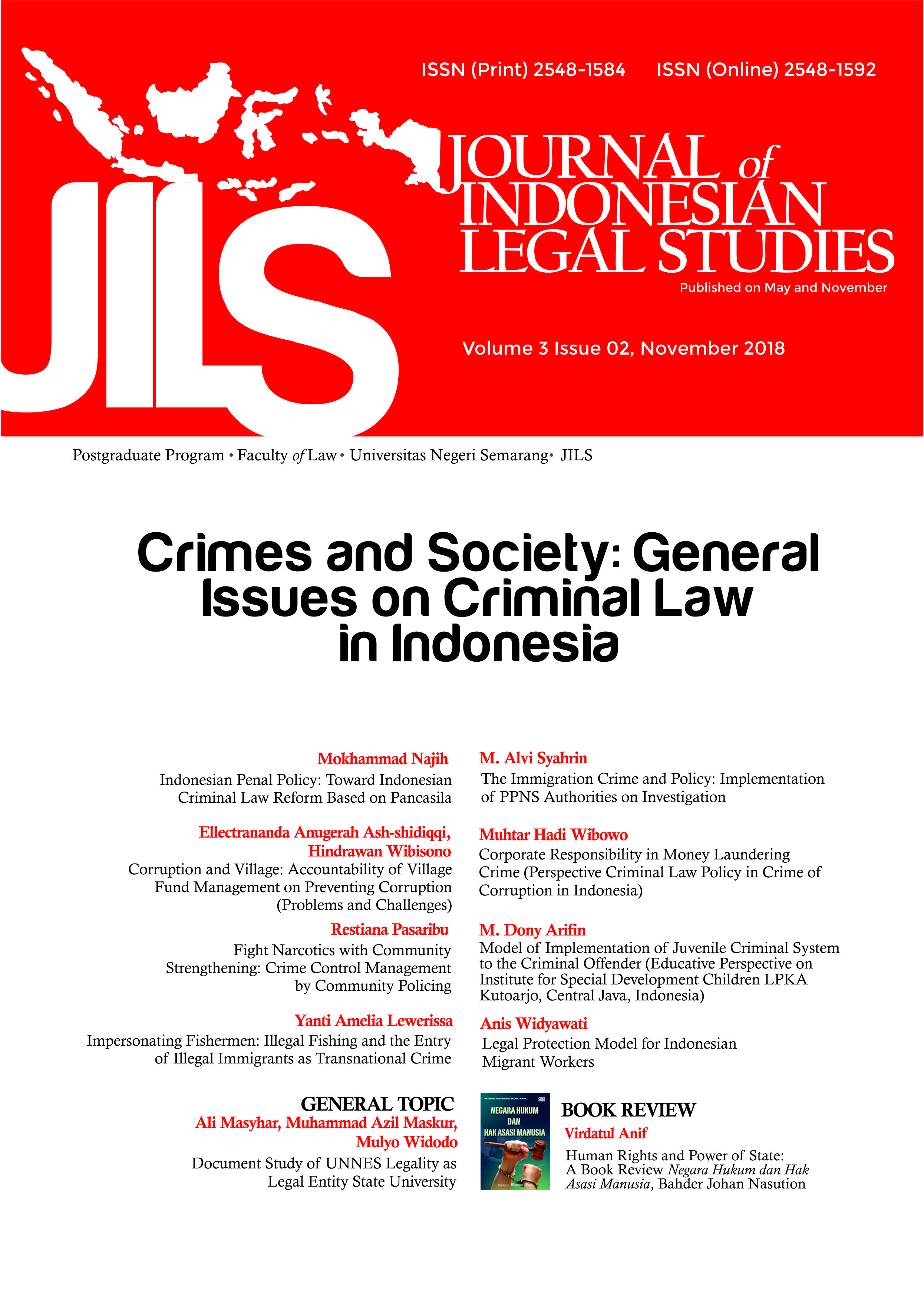Fight Narcotics with Community Strengthening: Crime Control Management by Community Policing
Main Article Content
Abstract
Drugs are the main enemy of nations in the world. Indonesia, it seems also has become a paradise for the generation of drugs. Various problems that occur in the community that can be resolved kinship will be resolved in RT Polmas assisted by community figures in the surrounding community. Thus, the empowerment of Polmas by Polrestabes Semarang city in the prevention of drug crime is crucial to be the main program Polrestabes Semarang city. The research location is in Polrestabes Semarang. This research emphasized that Policing Empowerment in Criminal Drugs Control is expected to provide active support to the Polmas to report it if there is any indication that the drug is involved in its territory and dare to disclose its circulation, arrest the dealer, the perpetrator and the producer. Cooperation and coordination and involvement of the above mentioned community participation must be optimally empowered, in order to support the success of the prevention of criminal acts of narcotics.
Article Details

This work is licensed under a Creative Commons Attribution-ShareAlike 4.0 International License.
All writings published in this journal are personal views of the authors and do not represent the views of this journal and the author's affiliated institutions. Author(s) retain copyrights under the licence of Creative Commons Attribution-ShareAlike 4.0 International (CC BY-SA 4.0).
References
Craib, Ian. Modern Social Theory. London: Routledge, 2015.
David Schanzer, Charles Kurzman, Jessica Toliver, Elizabeth Miller. “The Challenge and Promise of Using Community Policing Strategies to Prevent Violent Extremism: A Call for Community Partnerships with Law Enforcement to Enhance Public Safetyâ€, Research Report, January, 2016, Triangle Center on Terrorism and Homeland Security, Sanford School of Public Policy, Duke University.
Davies, S. G., Meliala, A., & Buttle, J. “Gangnam Style versus Eye of the Tiger: People, Police and Procedural Justice in Indonesiaâ€. Policing and Society, 2014, 26(4): 453-474, DOI:10.1080/10439463.2014.949712.
Davies, S.G. and Buttle, J.W. Policing in Indonesia: Exploring Ways in which the Legitimacy of the Police May Effect Economic Development and the Prosperity of the Indonesian State. Wellington: Ministry of Foreign Affairs and Trade, 2014.
Holmwood, J. “Functionalism and its Criticsâ€. In Austin Harrington (ed.), Modern Social Theory: An Introduction. UK: Oxford University Press, 2004.
International Crisis Group. “Indonesia: the Deadly Cost of Poor Policingâ€, Online, 2012, retrieved from http://www.crisisgroup.org/en/regions/asia/south-east-asia/indonesia/218-indonesia-thedeadly-cost-of-poor-policing.aspx, accessed 20 April 2018.
Choi, Kwan, and Ju-lak Lee. “Citizen Participation in Community Safety: a Comparative Study of Community Policing in South Korea and the UKâ€, Policing and Society, 2016, 26(2): 165-184, DOI: 10.1080/10439463.2014.922087
Masyhar, Ali. Pergulatan Kebijakan Hukum Pidana dalam Ranah Tatanan Sosial. Semarang: Unnes Press, 2008.
Marpaung, Leden. Proses Penanganan Perkara Pidana (Penyelidikan dan Penyidikan). Jakarta: PT. Sinar Grafika, 2009.
Muladi and Barda Nawawi Arief. Teori-Teori dan Kebijakan Pidana. Jakarta: Rajawali Press, 1998.
Muladi. Kapita Selekta Sistem Peradilan Pidana. Semarang: UNDIP, 1995.
Meliala, A., “Local Colours for Indonesian National Policeâ€. Policing and Society, 2002, 12 (2):153–161.
Meutia, Intan Fitri. “The Implementation of Community Policing in Indonesiaâ€, PhD Thesis, Kanazawa University Graduate School of Human and Socio-Environmental Studies, 2016.
Muradi. Politics and Governance in Indonesia: the Police in the Era of Reformasi. London: Routledge, 2014.
National Police Regulation No. 3 of 2015 concerning Community Policing (Peraturan Kapolri Nomor 3 Tahun 2015 Tentang Pemolisian Masyarakat).
Parsons, Talcott. The Social System. London: Routledge, 2015.
Parsons, Talcott, and Edward A. Shils. Toward a General Theory of Action: Theoretical Foundations for the Social Sciences. New Jersey: Transaction Publishers, 2015.
Peter J. Boettke, Jayme S. Lemke, Liya Palagashivili. “Re-evaluating Community Policing in a Polycentric Systemâ€. Journal of Institutional Economics, June 2016, 12(2): 305-325, DOI: 10.1017/S174413741500034X.
Pepinsky, H.E. “Issues of Citizen Involvement in Policingâ€. Crime & Delinquency, 1989, 35(3): 458–470.
Rachel E. Stein, Candace Griffith, “Resident and Police Perceptions of the Neighborhood: Implications for Community Policingâ€. Criminal Justice Policy Review, March 2017, 28(2): 139-154, DOI: 10.1177/0887403415570630
Ren, L., et al. “Participation Community Crime Prevention: Who Volunteers for Police Work?†Policing: an International Journal of Police Strategies and Management, 2006, 29 (3): 464–481.
Ritzer, George. Teori Sosiologi. Yogyakarta: Pustaka Pelajar, 2012.
Shafritz, Jay M., J. Seteven Ott, and Yong Suk Jan. Classic of Organization Theory: Eight Edition. Australia: Cengage Laerning, 2015.
Soekanto, Soerjono. Sosiologi Suatu Pengantar. Jakarta: Universitas Indonesia, 2004.
